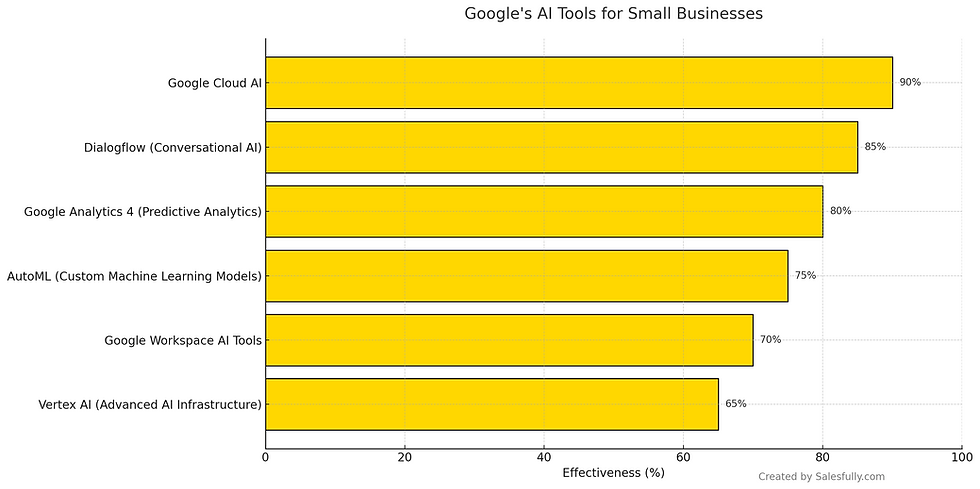Google AI Tools Small Businesses Can Use to Improve Customer Experiences
- Jules B.
- Dec 16, 2024
- 2 min read
A guide to harnessing conversational AI, predictive analytics, and automated support for better customer interactions.
In today’s competitive market, small businesses are constantly seeking ways to stand out and create meaningful connections with their customers. Leveraging Google’s suite of AI tools can offer transformative solutions for improving customer experiences.
From streamlining communication with conversational AI to optimizing marketing strategies with predictive analytics, these technologies provide small businesses with the ability to operate smarter, not harder.
Conversational AI for Customer Engagement
Google’s conversational AI solutions, such as Dialogflow, allow businesses to implement intelligent chatbots that handle customer inquiries with natural language processing.
Unlike traditional chatbots, these AI-driven tools provide nuanced, human-like interactions, reducing response times and enhancing customer satisfaction. For example, small businesses can use chatbots to offer 24/7 support without the need for additional staff.
A report by Juniper Research suggests that by 2027, chatbots will save businesses over $12 billion annually in customer service costs. Integrating this technology helps small businesses provide prompt, effective service, creating a seamless customer journey.
Predictive Analytics for Smarter Decision-Making
Predictive analytics tools powered by Google AI, such as Google Cloud’s BigQuery ML, allow businesses to analyze customer data and anticipate trends. These insights enable small businesses to make informed decisions about inventory, marketing campaigns, and customer preferences. For instance, predictive models can identify the likelihood of a customer making a repeat purchase, enabling targeted marketing efforts.
Statista reports that the global predictive analytics market is expected to reach $22.1 billion by 2026. For small businesses, leveraging predictive analytics ensures their resources are used efficiently while delivering a personalized customer experience.

Automated Customer Service for Operational Efficiency
Google AI tools like Contact Center AI are designed to automate customer service operations while maintaining high-quality interactions. Features like call routing, speech recognition, and automated issue resolution reduce operational bottlenecks and allow employees to focus on complex tasks.
According to Zendesk, 76% of customers expect consistent interactions across departments. Automated systems ensure smoother transitions and continuity, reinforcing trust in the brand.
Integration Strategies for Small Businesses
Implementing AI tools doesn’t require an IT department. Many Google tools offer user-friendly interfaces and tutorials for easy adoption. Collaborating with a tech consultant or leveraging Google’s free training resources can simplify the process further. Start with small-scale implementations like adding a chatbot to your website or using predictive analytics to segment email lists.
Measuring Impact
Successful integration of Google’s AI tools should be followed by tracking metrics like customer satisfaction scores, service response times, and sales conversion rates. Google Analytics’ enhanced features can help small businesses measure the direct impact of these tools on customer experiences.

Small businesses stand to benefit significantly from Google’s AI-powered tools. Whether it’s through conversational AI, predictive analytics, or automated customer service, these technologies can redefine customer interactions, enhance operational efficiency, and drive growth. By investing in accessible and scalable AI solutions, small businesses can ensure long-term success in an increasingly digital marketplace.
.png)
















Comments